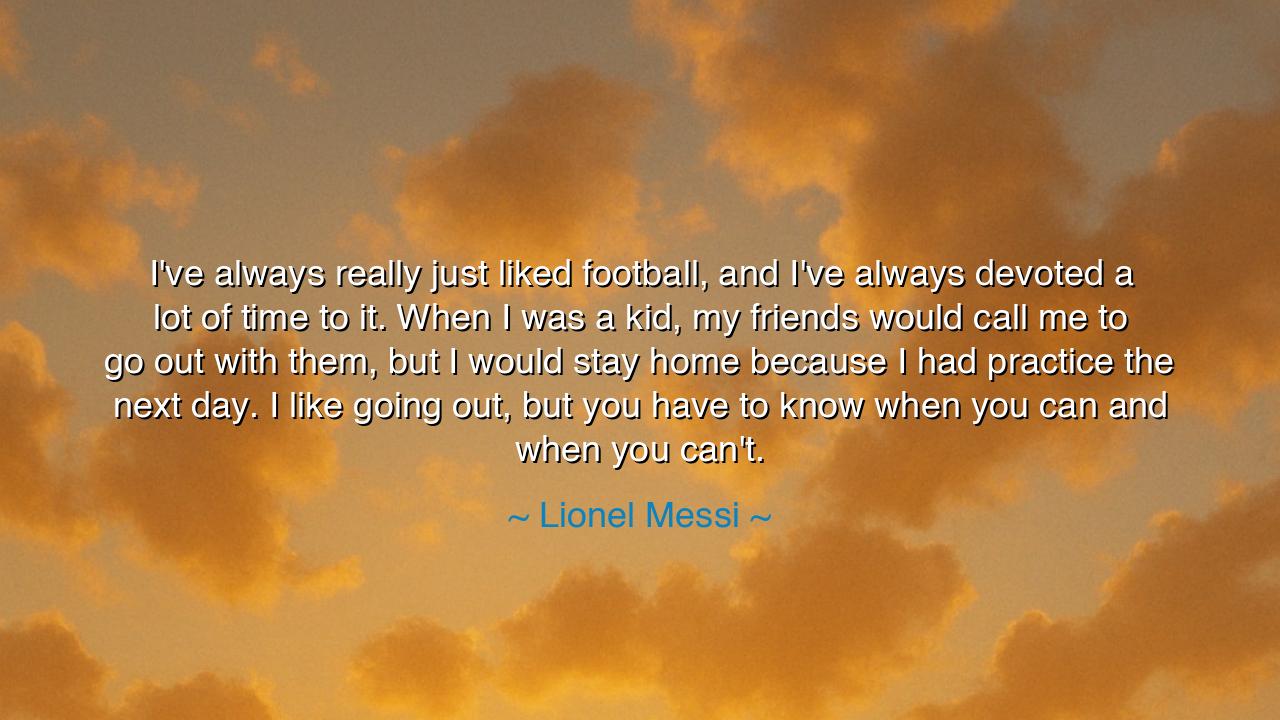
I've always really just liked football, and I've always devoted a
I've always really just liked football, and I've always devoted a lot of time to it. When I was a kid, my friends would call me to go out with them, but I would stay home because I had practice the next day. I like going out, but you have to know when you can and when you can't.






The great Lionel Messi, whose feet have danced upon the fields of the world like lightning guided by grace, once said: “I’ve always really just liked football, and I’ve always devoted a lot of time to it. When I was a kid, my friends would call me to go out with them, but I would stay home because I had practice the next day. I like going out, but you have to know when you can and when you can’t.” Though these words seem simple, they carry the heartbeat of discipline, the quiet fire of devotion, and the eternal truth that greatness demands sacrifice. They are the words of a man who understood, even as a child, that talent is only the seed — it is effort, restraint, and purpose that make it bloom.
In this reflection, Messi reveals the timeless law of mastery: that one must often turn away from the pleasures of the moment to pursue something enduring. The ancients called this virtue temperance, the power to govern one’s own desire. It is the strength that allows a warrior to sharpen his blade while others feast, the wisdom that moves the poet to write while the world sleeps. Messi’s words echo that sacred discipline — the choice not of denial, but of commitment. For every hour he spent in solitude, perfecting his touch upon the ball, he was building a destiny that would later inspire millions.
It is easy to admire the glory of a champion, but few understand the loneliness of preparation that lies beneath it. The crowd sees the goal, the trophy, the celebration — but not the long nights of repetition, the aches of muscle and spirit, the moments when the world’s noise calls and the heart must answer, “Not yet.” In this way, Messi’s story mirrors that of the great Leonidas of Sparta, who trained his warriors not for comfort, but for endurance. “Sweat in training,” he taught them, “so that you may bleed less in battle.” So too did Messi sweat in his youth, turning down fleeting pleasures to prepare for battles on green fields where nations would hold their breath.
There is also in his words a gentleness — a balance between discipline and joy. “I like going out, but you have to know when you can and when you can’t.” Here speaks the wisdom of moderation, the understanding that life is not about endless denial, but about rightful timing. To go out when one should train is folly; to train without ever resting is pride. The wise walk the middle path — knowing when to yield and when to stand firm. Messi’s restraint was not born of coldness, but of clarity. He knew what he wanted, and he guarded that purpose as a sacred flame.
Throughout history, the same principle has guided all who have achieved greatness. The artist Michelangelo once said, “If people knew how hard I worked to gain my mastery, it would not seem so wonderful at all.” The emperor Marcus Aurelius rose before dawn to study philosophy while Rome slept. The violinist Paganini practiced until his fingers bled, hearing in each note not mere music, but the echo of immortality. The pattern repeats across ages — those who rise above the common tide are those who have chosen discipline over distraction, purpose over pleasure.
Messi’s words, then, are not only about football; they are a mirror for all who dream. Whether one builds a business, writes a book, or raises a family, the principle is the same: to achieve something noble, one must sometimes say no — to comfort, to ease, to the invitations of the moment. The world tempts us with the sweetness of now, but the wise remember that tomorrow’s greatness is built on today’s restraint.
And so, my friend, let this be your lesson: devote yourself to your calling, whatever it may be. Love it with purity of heart, as Messi loved his game. When distractions arise, ask yourself — does this serve the dream, or delay it? Learn the sacred rhythm of sacrifice and joy, of labor and rest. For in mastering that rhythm lies the power to shape destiny.
Remember always: discipline is not a chain, but a crown. It binds the body so that the soul may rise. When you walk the lonely path of purpose, know that every choice made in silence builds a roar that will one day echo across the world. Like Messi, hold fast to what you love — and let that love make you worthy of greatness.






AAdministratorAdministrator
Welcome, honored guests. Please leave a comment, we will respond soon